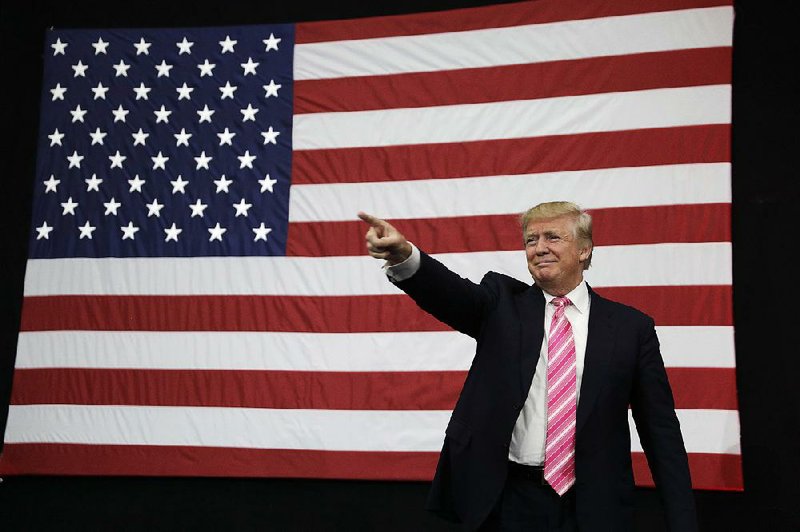MANHEIM, Pa. -- Donald Trump questioned Hillary Clinton's loyalty to her husband on Saturday night, adding a personal charge against his Democratic opponent to a week in which he repeatedly veered off script.
FULL ELECTION COVERAGE
Also late Saturday, The New York Times reported that it had obtained a portion of the Republican nominee's 1995 income tax return, which experts said indicated no wrongdoing but showed that he had declared a tax deduction so substantial that it could have allowed him to legally avoid paying any federal income taxes for up to 18 years.
Trump told thousands gathered Saturday in Manheim, Pa., that "Hillary Clinton's only loyalty is to her financial contributors and to herself. I don't think she's even loyal to Bill if you want to know the truth. ... Why should she be, right? Why should she be?"
The attack, referring to former President Bill Clinton's infidelities, came as Trump works to sharpen his focus on the economy -- and his Democratic opponent's shortcomings -- as he treks across the Midwestern battlegrounds whose support he needs to become the 45th president of the United States.
Trump's unscripted moments are often drowning out his scripted ones -- moments that his friends and foes agree are his best. Fellow Republicans have expressed frustration that his off-the-cuff comments have diverted attention from his economic message, alienating women and members of minority groups while early voting is already underway in some states.
"He's not going to change. This is who he really is," said former Minnesota Congressman Vin Weber, a Republican. "It's ridiculous to even argue this, but if he could stay on message, which is to say if he could be somebody else, he could win."
On Saturday night, Trump raised for the first time questions about Hillary Clinton's loyalty to her husband. He also questioned her physical stamina, her mental health and insisted that she has contempt for all Americans.
"She should be in prison," Trump declared. His supporters, meanwhile, chanted: "Lock her up!"
Also Saturday, he questioned the integrity of the nation's voting system, warning supporters to keep a close eye on polling places after they vote next month -- especially in "certain areas."
"We can't lose an election because of, you know what I'm talking about," he said. "A lot of bad things happen. I don't want to lose for that reason."
Trump has repeatedly suggested that only election fraud could stop him from becoming president. There has never been evidence of widespread voting fraud in the United States.
On Twitter and in interviews, the New York businessman over the past week has fueled a political firestorm, after an underwhelming debate performance, criticizing a former Miss Universe, first seizing on her weight gain and then calling on the world to view her "sex tape."
Clinton remains unpopular and untrusted by a segment of the electorate.
Ohio GOP Chairman Matt Borges called Clinton a "liar" and said she deserves to lose the election. "And just when it's looking like it's a good bet that she will lose, we're talking about things that I believe don't help us win," he said, referring to Trump's tweets.
There is little sign that Trump's approach will help him expand his support beyond the white, working-class voters who cram into his rallies. During Monday's debate, Trump said black voters are "living in hell." And his four-day feud with former Miss Universe Alicia Machado, a Venezuelan who is now an American citizen, threatens to push his low standing among women and Hispanics even lower.
Trump again took to Twitter on Saturday, this time to complain about his microphone during the first debate five days ago. The Commission on Presidential Debates acknowledged Friday that there was an issue with Trump's microphone, which was quieter than Clinton's at times.
"The so-called Commission on Presidential Debates admitted to us that the DJT audio & sound level was very bad. So why didn't they fix it?" Trump tweeted. He raised the issue again at a Saturday rally in Pennsylvania.
Trump and Clinton are to debate again Oct. 9. Their running mates are set to debate Tuesday.
In the crowd of thousands in Pennsylvania, at least one Trump supporter wanted him to back off the personal attacks on Clinton.
"He needs to stick more to the relevant issues," said Grace Sauder, a 67-year-old retired nurse from Mountville, Pa. "It just makes him look and sound immature."
1995 tax returns
Trump declared a $916 million loss on his 1995 income tax returns, records obtained by the Times show, and tax experts hired by the Times said the tax deduction was so substantial that it could have allowed him to legally avoid paying any federal income taxes for up to 18 years.
The 1995 tax records, never before disclosed, reveal the tax benefits that Trump derived from the financial wreckage he left behind in the early 1990s through the management of three Atlantic City, N.J., casinos, his ill-fated foray into the airline business and his ill-timed purchase of the Plaza Hotel in Manhattan.
Although Trump's taxable income in subsequent years is as yet unknown, a $916 million loss in 1995 would have been large enough to wipe out more than $50 million a year in taxable income over 18 years, the experts said.
The $916 million loss certainly could have eliminated any federal income taxes Trump otherwise would have owed on the $50,000 to $100,000 he was paid for each episode of The Apprentice, or the roughly $45 million he was paid between 1995 and 2009 when he was chairman or chief executive of the publicly traded company he created to assume ownership of his troubled Atlantic City casinos, the experts said.
Ordinary investors in the new company, meanwhile, saw the value of their shares plunge to 17 cents from $35.50, while scores of contractors went unpaid for work on Trump's casinos, and casino bondholders received pennies on the dollar.
"He has a vast benefit from his destruction" in the early 1990s, said one of the experts, Joel Rosenfeld, an assistant professor at New York University's Schack Institute of Real Estate.
Rosenfeld offered a description of what he would advise a client who came to him with a tax return like Trump's: "Do you realize you can create $916 million in income without paying a nickel in taxes?"
Trump declined to comment about the documents. Instead, the campaign released a statement that neither challenged nor confirmed the $916 million loss.
"Mr. Trump is a highly-skilled businessman who has a fiduciary responsibility to his business, his family and his employees to pay no more tax than legally required," the statement said. "That being said, Mr. Trump has paid hundreds of millions of dollars in property taxes, sales and excise taxes, real estate taxes, city taxes, state taxes, employee taxes and federal taxes."
The statement also said that the document was "illegally obtained, a further demonstration that the New York Times, like establishment media in general, is an extension of the Clinton Campaign, the Democratic Party and their global special interests."
Separately, a lawyer for Trump, Marc Kasowitz, emailed a letter to the Times saying that publication of the records is illegal because Trump has not authorized the disclosure of any of his tax returns. Kasowitz threatened "prompt initiation of appropriate legal action."
The documents arrived by mail at the Times with a postmark indicating that they had been sent from New York City. The return address on the envelope showed they had been sent from Trump Tower.
Trump's refusal to make his tax returns public -- breaking with decades of tradition in presidential contests -- has emerged as a central issue in the campaign, with a majority of voters saying that he should release them. Trump has declined to do so, saying it's because he is being audited by the IRS.
At Monday's debate, Clinton suggested that Trump was refusing to release his tax returns so voters would not know "he's paid nothing in federal taxes" and pointed out that Trump had once revealed to casino regulators that he had paid no federal income taxes in the late 1970s. To those assertions, Trump responded, "That makes me smart."
The tax experts consulted by the Times said that nothing in the 1995 documents suggested any wrongdoing by Trump, although the extraordinary size of the loss he declared would have probably attracted extra scrutiny from IRS examiners.
"The IRS, when they see a negative $916 million, that has to pop out," Rosenfeld said.
Clinton campaign cash
Clinton raised $154 million for her campaign and the Democratic Party in September, her biggest monthly fundraising haul yet in her bid for the White House, pushing her total for the election cycle toward $1 billion.
Last month, Clinton raised about $84 million for her campaign committee, up from $62 million in August. About $70 million was raised by the Hillary Victory Fund, which divides money among the campaign, the Democratic National Committee and various state parties, according to a statement Saturday from her campaign.
The committees ended September with a combined $150 million of cash on hand for the final push to Election Day. More than 900,000 people donated to Hillary for America in September, the campaign said. The average donation for the month was about $56.
Clinton accrued a slew of endorsements from newspapers in September, ranging from such expected backers as the Times to such once-certain GOP advocates as The Dallas Morning News, the Arizona Republic and the Cincinnati Enquirer, which on Sept. 23 called for "a leader who will bring out the best in Americans, not the worst."
On Friday, USA Today ended its tradition of not taking sides and published an anti-endorsement, contending that Trump "lacks the temperament, knowledge, steadiness and honesty that America needs from its presidents." The newspaper didn't back Clinton but advised readers to "Stay true to your convictions."
The same day, The San Diego Union-Tribune endorsed Clinton -- the first Democrat it has endorsed in its history.
Trump is supported by far fewer publications. They include a newspaper owned by son-in-law Jared Kushner -- the New York Observer -- and the National Enquirer, a tabloid whose parent company is run by Trump friend David Pecker and whose content usually focuses on celebrity scandal.
Trump scorned the negative editorials Friday, tweeting that "The people are really smart in cancelling subscriptions to the Dallas & Arizona papers & now USA Today will lose readers! The people get it!"
Some experts shrugged off the implications of endorsements from publications, contending that the endorsements don't hold much sway.
They "don't have nearly the impact they used to," said Mark McKinnon, co-host of Showtime's political show The Circus and a longtime adviser who has worked with former President George W. Bush and Sen. John McCain of Arizona, the GOP's 2008 presidential candidate. "There are just way too many other sources of information for voters today."
Information for this article was contributed by Steve Peoples, Jill Colvin, David Bauder and Hillel Italie of The Associated Press; by Elizabeth Dexheimer and Bill Allison of Bloomberg News; by Michael Finnegan of the Los Angeles Times; and by Jeremy W. Peters, David Barstow, Susanne Craig, Russ Buettner, Steve Eder, Patricia Cohe, Megan Twohey and Kitty Bennett of The New York Times.
A Section on 10/02/2016

